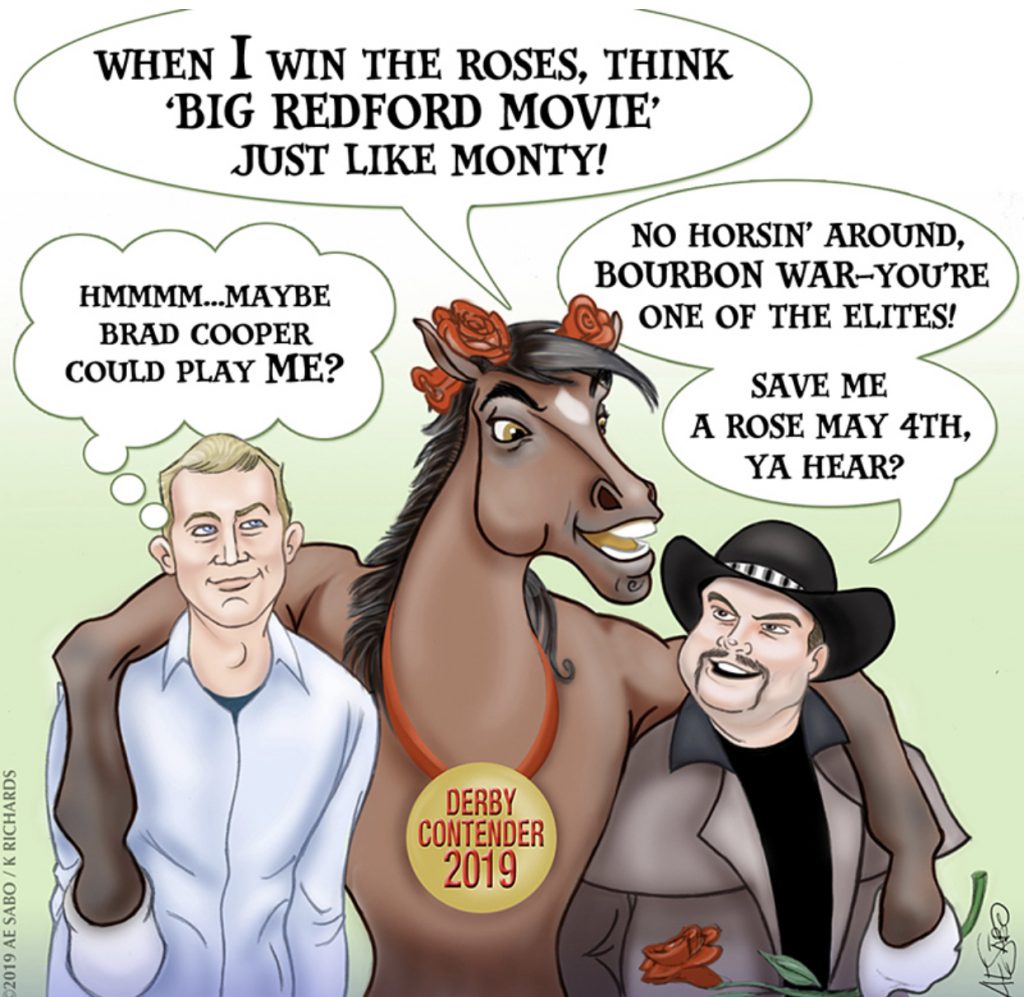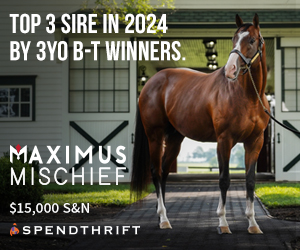
By Kate Richards
What is the common question that fans and bettors ask when we are looking at the composition of the Kentucky Derby field? Does this horse have what it takes to be a champion on the first Saturday in May?
Every year, hundreds of thoroughbred foals are born with the pedigrees and physical attributes that only hint at potential. Progressing into the yearling sales threshold, there are the significant outliers become apparent, according to Kerry Thomas and Peter Denk. As partners in THT Bloodstock, they distill the most desirable qualities into three categories: sensory soundness, physical attributes and natural herd tendencies. Yearling leaders can be spotted often in a field, yet that comes with a caveat, according to Thomas:
“Mother nature hides leadership in plain sight. Within a natural herd, the noisier and more volatile the horse, the less likely that horse is the alpha”.
Thomas relates this to his up-close encounters with the star-crossed Barbaro. He reflected, the colt had a quiet, yet noticeable eye-catching presence: “calm, curious, observant…did not get rattled, ears working….” Adjustment to surrounding is critical as the Churchill Downs backside village during Derby week can be a chaotic batter of smells and the high-pitched human energy of frenetic media types, nervous owners and contentious trainers. Thoroughbreds are sensory-processing animals and capable of differing levels of performance anxiety and ability to adjust to stress according to the THT partners. Pete Denk noted that the outliers present in a human athlete, executive or even a combat pilot are in the battle-tested horses that reach the Derby stage in Louisville: the ability to pro-act and work with the jockey. One of their unique offerings, tailored to the growing interest in equine psychology offers insight into the past five years of Derby fields with profiles on the herd influencers. These are available along with forthcoming 2019 analysis at their website along with further descriptions of analytic patterns at www.thtbloodstock.com. “The better the elite horse adapts to chaos, the better the chances that they will show up on Derby day. High-level athletes that have earned the points to get into the Derby have performed successfully within previous smaller ‘herds’… the Kentucky Derby is different because the number of the field or herd, the training environment, their barn team that they come from plus how they as individuals can tolerate the traveling conditions.”
Within a race field of contenders, a herd is formed and according to the THT analytic typing, how a racehorse reacts, and races competitively within changing conditions is a product of their identity in relation to the hierarchy of the herd. An elite horse racing at the Derby level factors their position quickly. The individual personality called IHD can be reflected in how the individual adapts and identifies herd rank and then how the herd accepts that position, called GHD, group herding dynamics.
The intuition, experience and analytics brought to the sales barns are similar to dissecting the Derby according to the THT methodology added to observing traits in earlier races. Experience with recognizing the potential in a yearling racing prospect can attest to their success in spotting one of this year’s contenders, Bourbon War. According to the partners, a tractable knowledge of pedigrees, nicks and farm environment day-to-day operations relative to a purchase candidate combined with hours spent with the horse are the factors for their evaluation and recommendations. “Incremental is our understanding of what the buyers are looking for in a racehorse and where they plan to race and on what surface” acknowledged Kerry. THT also offers a second opinion service to on-premise trainers and agents.
“Bourbon War had a presence that showed confidence and curiosity indicating an ability to learn…plus he was a happy colt with an easiness around the strangers that were handling him”. Thomas and Denk look for the early indications in yearlings of tractability and adaptation, qualities that separate high-level athletes from the lower to mid-level horses that can represent 85% of those yearlings coming through the auctions, that make it to the track.
Evident in their analysis and one of their most attractive services for a handicapper or a competing jockey is their Derby Herd Dynamic available for purchase after the field is confirmed. Moreover, to their credit, the duo selected the previous three Derby winners and predicted Triple Crown victories for both Justify and American Pharaoh, both of whom were spotted in their maiden races as elite mental and physical athletes, both possessing high-level emotional conformations to match their speed. Another one of their picks was the social media phenomenon, California Chrome, who ran, early on, like an older horse, combining natural ability with an acute awareness of where his competitors ranked in that temporary herd hierarchy. Many of his workout photos on social media show him as an observer of other horses as if he was sizing them up. He was.
“Chrome benefitted from his focus training…he was like a luxury sports car that needed guidance…showed his herding tendencies that were corrected with blinkers to maintain forward focus…he just got smarter from each race.”
Justify, before the 2018 Derby, was one of the best examples of a precocious physical presence matched by his emotional sensory development, according to their pre-Derby report from last year. American Pharaoh, another very balanced champion with observable confidence and easy barn manners, illustrated an extraordinary combination of the natural ability added to learned behavior, something Kerry noted as reminiscent of Zenyatta’s running style as being able to run within herself, save her energy and adjust to her rhythm. The only exception, perhaps, being the adjustment to the sandy track and the kick-back, portrayed in her late run from the back during the Breeders’ Cup Classic in 2010.
Understanding how a horse makes sense of everything is at the heart of THT Bloodstock’s mission and evokes the nature of their horsemanship. “We don’t call it whispering” claimed Thomas.
Our evaluation is dedicated to identifying instinctual traits and behaviors before bad habits take hold. An elite’s emotional conformation operates the clutch between the sensory system and the physical gears…our purpose is to assist the connections as well as the horse, early on, towards positive experiences in racing”.



